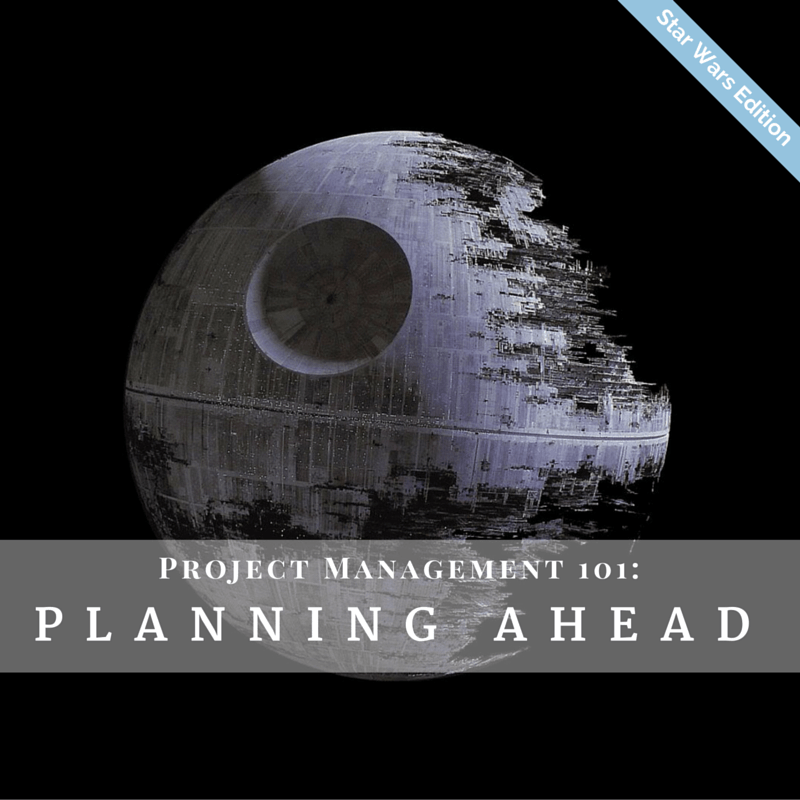
A few facts about me before we begin…
1. I am somewhat obsessive
2. I love movies
3. 1+2 = a need to watch the same movies over and over
I love Star Wars. When I became a mom, I looked forward to introducing the movies to my son (in the appropriate order). He turned four and I couldn’t wait any longer. It was time for the original movie that started it all. Like me, he will watch the same movies over and over, and I finally had a movie buddy.
As a project manager, I find Star Wars particularly fascinating. There are many lessons embedded in the storyline of what to do, and even more on what NOT to do, as a project manager. Today, I thought I’d share my views on General Tarkin, the only guy other than the Emperor to give Darth Vader orders.
Throughout the movie, the General executes sound (though twisted and evil) strategy. He takes calculated risks, such as threatening Princess Leia with the destruction of her home planet so that she’ll give up the location of the rebel base. She appears to fall for the ruse, and confesses the location. Despite her cooperation, he destroys her home planet anyway, demonstrating the destructive nature of the Death Star to create fear throughout the galaxy. Not only did he have a primary goal of finding and destroying the rebels (his short game), he had a secondary intent of ensuring there would be no further threats from cowed planets across the galaxy (his long game). What a strategist!
Beyond the General’s awesome military prowess, it is implied that he’s a strong program manager as well. The Death Star was constructed on his watch, and I don’t know that a more complex set of interdependent projects could be imagined. As a project and program manager myself, I have an idea of the depth and breadth of skills the General would need to possess to be successful with such an undertaking.
When I consider the General’s combination of skills – military strategist and project manager – he just shouldn’t have lost. Every time I watch the movie, I get frustrated all over again. It isn’t possible that he could have successfully built the Death Star, had Vader on a leash, and then ended up failing so miserably at the hands of the rebels. I have no explanation, other than he must have had a brain fart.
Clearly, the General never would have defeated the rebels in a cinematic universe. The good guys losing eliminates any plot – or audience – for future movies. However, stretching the imagination for a moment, let’s consider what the General could have done if he had even an ounce of the military prowess and project management ability he possessed up until the last few moments of his life.
Successful project and program managers proactively identify and assess risks. Those risks that have the highest probability of occurrence and potential impact require close watch and mitigation strategies. That’s just Project Management 101. When one of the General’s men approached him with the risk that the X-Wing fighters could potentially destroy the death star, the General dismissed their chances and would not consider the threat. Now, the potential impact – death – was HUGE. In that moment, he determined that the probability of occurrence was so low that he didn’t require a mitigation strategy (an escape route). Obviously, a huge fail on his part, because he ended up dead.
In my opinion, his assessment created a paradox in the movie. If there was no probability of occurrence – why was Darth Vader charged with recovering the stolen plans for the Death Star? If it was indestructible, then the plans were not important, because they would not have revealed any risk. If the plans were not important, then Vader never would have chased down Princess Leia, Luke and Han never would have rescued her, a homing beacon never would have been put on the Falcon, and they never would have led the General to the rebel base and he wouldn’t have died. Paradox!
Despite the clear contradiction in the movie, let’s move on to fail #2 by the General. The 7 P’s is a critical lesson I learned at the hands of the Marine Corps. It holds true for all project managers and military leaders, which is why I have a hard time believing the General didn’t consider it. Proper Prior Planning Prevents Piss Poor Performance! For the General, the 7P’s could have kept him alive. Can anyone explain to me how a General with Tarkin’s track record failed to have the weapon system ready to go as soon as the rebel planet was in range?!?! Anyone? I have never understood why he waited until the planet was fully in range to start the firing sequence. He had plenty of time to setup for the perfect shot and be ready to go. Instead, he wasted seconds or minutes and ended up dead.
If the General had accurately assessed the risk presented by the X-Wing fighters, he minimally would have had the weapons system ready to go when it was time to pull the trigger. He could have had the system armed and and left the Death Star, ordering the planet’s destruction from afar. However, that demonstrates weakness and a disregard for his men. A captain goes down with his ship, so to speak. If Tarkin had left the Death Star to maintain continuity of leadership and reduce overall risk, his men would revolt and there would be anarchy. Ultimately, General Tarkin could not have left and had a successful outcome. Regardless, he would prefer to die than show any sign of weakness to the Rebels. He was hoist by his own petard if you will.
Since the General could not have mitigated risk by leaving the Death Star, even if he had believed the risk was real, and he failed to have the weapon system ready to go in advance, it was basically a coin toss as to whether he or the Rebels would pull the trigger first. A coin toss. What successful military strategist, project manager, or leader would leave their life, and the lives of their men, up to a coin toss? That’s the final contradiction in the movie – someone of Tarkin’s skill would not.
I’ll admit to spending way too much time watching and analyzing this movie. However, I do have a good excuse, beyond being “somewhat obsessive.” Star Wars has held up over the years as training material for developing other project managers. Who doesn’t love a good story? They help reinforce what might otherwise be dismissed as simple theory. And a story that makes you think – even if others might not obsess about it to the the level I have – is more likely to stay with you.









2 Responses
Kristin, thanks for sharing an insightful analysis!
From your description of the situation, my favorite comment is: “What successful military strategist, project manager, or leader would leave their life, and the lives of their men, up to a coin toss?”
Hindsight is 20/20, but it sounds like General Tarkin considered but then dismissed a number of concerns that seemed important even before things went wrong.
Karl – Glad to see another movie – and Star Wars – aficionado that can appreciate the tie to our real-life challenges as PM’s or leaders. Thank you for the feedback!